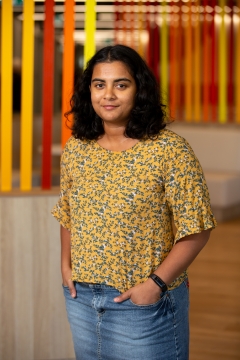If you ask students what their least favourite type of assessments are, group projects would make the top three. In fact, it might even be number one. Why is group work so disliked when we know it is a fundamental graduate attribute that teaches us about collaboration?
Dr Nirmani Wijenayake, an Education Focussed Lecturer from the School of Biotechnology and Biomolecular Sciences (BABS), dispels this negative perception by demonstrating that when students are equipped with knowing ‘how to’ work in groups, it can lead to positive and rewarding learning experiences.
Nirmani has implemented a group work assessment into her biochemistry course in 2018 to increase student engagement and build learning communities. Based on student feedback, the group work aspect was refined over the years to introduce a 10-week program that teaches students how to effectively work in a group. The program consists of hands-on group bonding activities, a workshop on conflict resolution, peer-to-peer teaching activities, feedback sessions, presentations, and an individual term long reflection diary.
The benefits of the program have been clear with 88% of students strongly agreeing or agreeing they have learned skills to work cohesively and effectively as a group. Students were empowered to take charge of their own learning and formed better connections with their peers, which led to better engagement with the course overall. Due to its success, the same program has been adapted into a fully online general education course with over 400 students this year.
Please join us in the next Connections seminar, a forum to enable peer-to-peer sharing of good practice in learning and teaching, where Nirmani will share her recent experiences.
About the Speaker
As an Education Focussed Lecturer at the School of Biotechnology and Biomolecular Sciences (BABS), Dr Nirmani Wijenayake convenes and teaches 10 undergraduate courses, with enrolments of 60-800+ students, across the Faculties of Science and Medicine. Since 2015, she has sustained high-quality teaching, while pioneering the integration of adaptive learning, lab e-notebooks and many other technologies which have ensured her students receive a distinctive blended educational experience that has inspired and enhanced their independent learning. Many of Nirmani’s teaching resources and strategies have been adopted by others, contributing to her well-evidenced leadership and mentorship of colleagues across UNSW, as well as sharing her knowledge nationally and internationally. Nirmani was an award recipient of the 2020 UNSW Vice-Chancellor’s Award for Outstanding Contributions to Student Learning.
